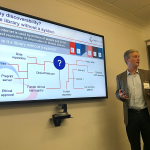Featuring comments from the co-chair of cOAlition S, draft recommendations from the MIT Open Access Task Force, strategies to break the academic status quo, and the need for research transparency
Engagement rather than enforcement via Samuel Moore
Many academics have spoken out against Plan S, claiming that the plan limits their academic freedom by telling them where they can and cannot publish. However, it has been speculated that what the academic community is really contesting is the mandate to publish open access that doesn’t come from inside academia. The opinion piece published by Samuel Moore this week reiterates these sentiments, and adds that promoting open access within academia is not about policies, which seek compliance and require additional labour from researchers, but is about engagement with numerous different models of open access that are already available. Academic research is rooted in deep traditions that many are reluctant to see let go. Making strides towards Plan S compliance will make academics step out of their comfort zone, and policy makers need to give them a reason to do this.
How much time is really required to implement Plan S? via Publishing Perspectives
This week, Publishing Perspectives interviewed the co-chair of cOAlition S, David Sweeney, to get his take on the feedback received on Plan S, most of which centred on publishing costs. Although cOAlition S are not addressing publishing costs at present, Sweeney highlighted that this feedback provides further support of the need for transparency from publishers, so that informed decisions on fair article processing charges can be made in the future. Sweeney pushed back against claims that the timelines for the plan’s implementation are too harsh and reminded readers that the requirements effective from 1 January 2020 will only apply to new grants, and any emerging research outputs will not be ready for publication until a few years later. He also asked those who say that the timescale is too tight how much time would be enough for the transition to open access. The interview concluded with Sweeney emphasizing the need for cOAlition S to extend beyond Europe and for the plan to be implemented in a time-efficient and collective manner.
Transparency – not just an issue for clinical trials via Stat News
With so much focus on clinical trials, transparency in other contexts is often overlooked. However, in the wake of last year’s CRISPR baby scandal, the World Health Organization established an advisory committee on editing human DNA. This week, the committee announced its intention to ask the United Nations agency to establish a global registry of all studies involving human genome editing at any stage of human life. Interestingly, despite agreeing that the editing of human germline cells (eggs, sperm and early embryos) was irresponsible, the committee did not actively prohibit it. Although a registry would increase transparency and governance over genetic research, the committee is yet to provide a clear plan as to how it would enforce registration, particularly on scientists not funded by reputable agencies.
Draft recommendations to broaden MIT open access policies via MIT News
The Massachusetts Institute of Technology (MIT) was quick to rally behind the open access movement by establishing a task force in 2017, followed by the release of its white paper at the end of 2018. This week, the MIT Open Access Task Force released draft recommendations to support and increase the accessibility of MIT research, data, software and educational material. Input was gathered from experts across campus to develop a clear view of local, national and global open access practices. In addition to focusing on university-wide policies, infrastructure and resources, the recommendations also consider the need to increase open access advocacy and awareness. They highlight the important role played by institution and department heads in setting a positive example, developing plans, and encouraging all members of staff and students to engage in open access practices. The recommendations also advocate more recognition for researchers who are actively sharing their data. The full recommendations can be found here and are available for public comment until 17 April 2019






